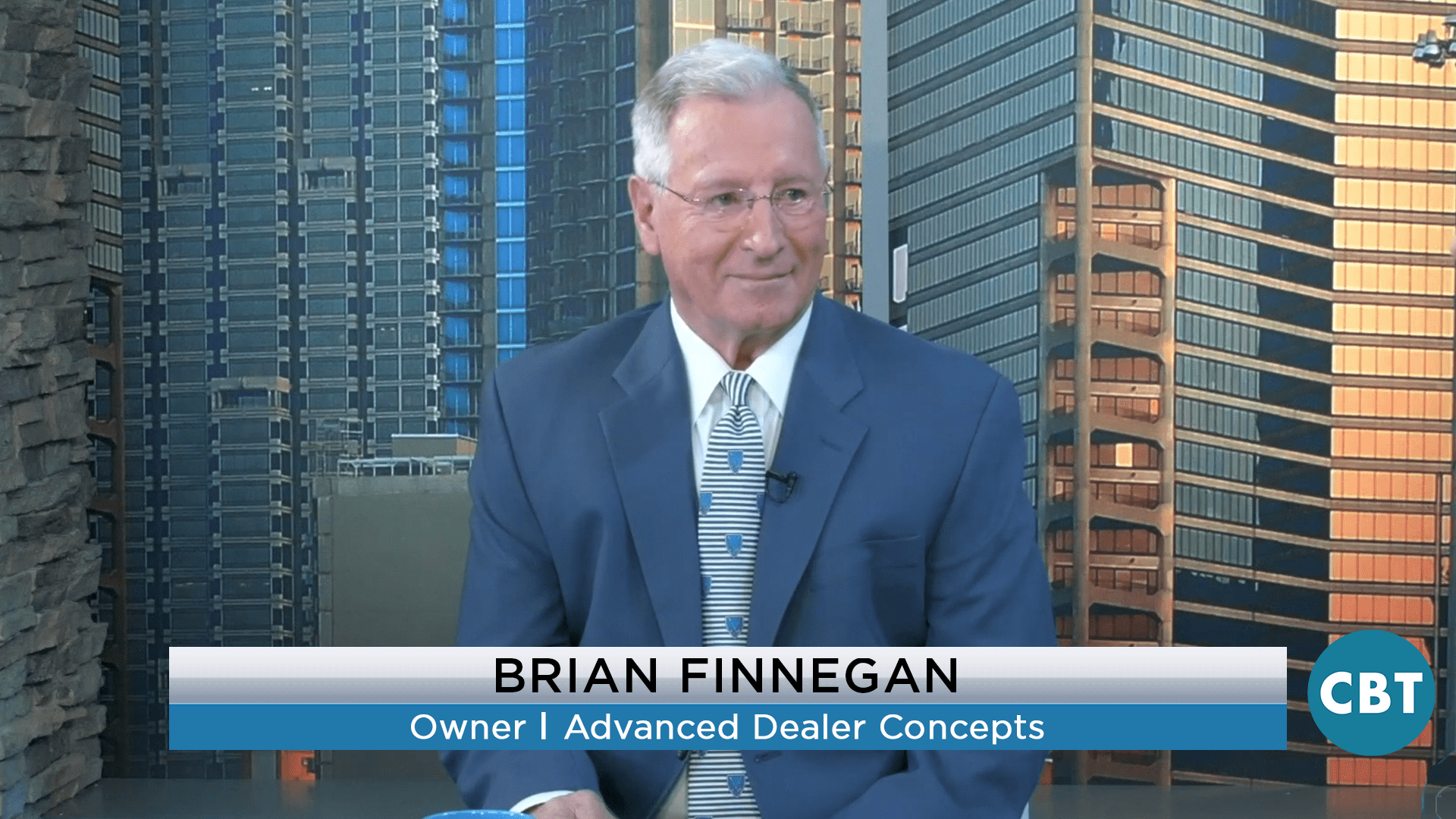On today’s show, we discuss the turnover dealers see with middle managers and the challenges they face on the showroom floor every day with Brian Finnegan, president of Advanced Dealer Concepts and former sales training director with AutoNation. Brian has also served as general manager of some of the largest Mercedes Benz and Lexus dealerships in the southeast.
Jim Fitzpatrick: Welcome back to the show Brian.
Brian Finnegan: I’m glad to be here again, thank you so much.
Jim Fitzpatrick: Great, great. We touched on a lot on your last visit, and I kind of want to pick up on some of those pieces. Dealers are challenged and sales managers are challenged alike on showroom floors. Where do you get good ones? How do you place them? What are the tasks that middle managers and sales managers, I should say, are given each day? They’re worn out, right? Talk to us about that.
Brian Finnegan: Absolutely. Desk managers, for example, typically are your middle managers. They’re trying to run the desk. They’re trying to be there for the salespeople. But the truth of the matter is, you walk into any desk office and you’ll see them there. They’re doing some kind of reports. They’re doing something for the manufacturer. They’re on the phone. They’re so busy in there that the salesperson coming in sometimes is almost interrupting.
Jim Fitzpatrick: Exactly.
Brian Finnegan: Seriously, I’ve seen them…
Jim Fitzpatrick: And we’ve both been desk managers so we know what that’s like.
Brian Finnegan: It was taboo to say, “Wait, I’m busy.” He’s with a customer, that’s what we’re supposed to do. I think right now, most of the middle managers are just doing way more, number one, than they’ve really been trained to do; but number two, than they should be doing. Their priority should be the customers and the salespeople. If there’s one reason why, and we’ve talked about this many times, why our salespeople are not really being trained the way they should be is we’ve got those middle managers doing so many things that training just keeps getting pushed back and back and back on the priority list.
Jim Fitzpatrick: That’s right.
Brian Finnegan: A lot of the desk managers are absolutely great managers. They’re also great leaders. When you see them, you can recognize it absolutely immediately. First of all, turnover is lower in the dealership, employee engagement is higher throughout the sales force. These people like working there because of who they’re working for. I think we’ve said it before that salespeople don’t leave a job, they leave a manager.
Let’s talk for a minute about what should these managers prioritize. I guess the first thing I would ask is do they actually evaluate their salespeople? Do they evaluate their entire sales staff and say “where are the strengths and what are the areas that we need to beef up?” If they do, unfortunately, what happens is they hold a sales meeting the next day and they talk about it one time in the sales meeting. It comes across as “You guys stink,” and we just fixed the problem.
I think what we need to do, and I say this to the dealers, and I say this to the GMS, give your middle managers a list of priorities, and before you give it to them, look at it and ask yourself if they really have time and opportunity to do this for you. Because they really don’t know. Remember the story I told you about when I became a sales manager, the dealer said “How long you been here? Just do what Vic did.”
Jim Fitzpatrick: And Vic’s gone.
Brian Finnegan: Yeah, and Vic’s gone. We just fired him.
Jim Fitzpatrick: Vic couldn’t get the job done. But you do what he did.
Brian Finnegan: My game plan was to do what Vic did. A lot of these middle managers coming in, really they have the same game plan. They’ve observed management, whether it was good management, mediocre management or poor management, and that’s their education level at this point in time.
Jim Fitzpatrick: I think what’s cool about what your company provides too is that you can customize based on what the dealer’s needs are. It’s not if the dealer calls you and says, “Hey, Brian I want to sign up with your training program,” that they just signed a six month or a one year contract as some of the trainers out there in the industry will do. They can call you and say, “Hey, come on in and spend a few days with me or spend a week with me. Let me know what I’ve got going on. Help me in these different areas,” and then maybe you’ll charge them by the day or by the project to say, let’s take a look first and foremost at what your needs are.
Sometimes dealers think they have a salesperson problem and turnover problem and how do we get the sales department going. To your point, it might be a management problem that can fix that. It might be both, of course. I think it’s kind of cool that you go in and help the dealer and say, “Instead of signing up for a one year contract you can’t get out of, let’s see what your needs are first.”
Brian Finnegan: Exactly to your point. If we went in and trained new hired or fairly inexperienced salespeople for you as a dealer, if that desk is not supporting the processes and the procedures that the dealer insists upon, then quite honestly we just wasted the dealer’s money. An awful lot of times I will let the dealer know up front whether or not we need to work here first. It really brings more value to them that way.
Jim Fitzpatrick: While you’re at the dealership, can you do both? Can you spend half a day with the managers in training and the other half with salespeople, or is it best done where you’re a week with the managers and then the following week with the sales department?
Brian Finnegan: I like to keep it separate. You really need to focus on whether it’s the salespeople because as you know our training is not in a classroom for two hours and we’re done. We’re out on a showroom floor with them role playing next to them, coaching, everything they do. It’s an all-day thing. We typically do about three days with relatively inexperienced salespeople. Literally just all day, every day. If I need to do managers, whether it’s before or after, then basically I’m at the desk with them all day, probably until closing that night, because let’s face it most of these stores are getting most of their traffic at night anyway.
Jim Fitzpatrick: Of course.
Brian Finnegan: And I get a much better… I can give the dealer just a much better, more objective feedback if I’ve been at that desk office for two, three days. Typically, that’s what it is. That’s a two, three-day thing.
Jim Fitzpatrick: Sure. If you had to come up with two or three things that dealers should focus on with regard to their managers and sales departments, specifically to maximize gross profit, to get more than their fair share of the business that’s out there, for the balance of 2019, ’cause it looks like we might have some headwinds depending on the expert that you talk to. Either way, it’s not going to be 17.5 million vehicles this year. What would those two or three things be?
Brian Finnegan: I think the first thing I would do, is if the dealer is in the house or the general manager is in the house, try to observe that desk operation once in a while. I see desk managers handling incoming sales calls, handling peak calls, doing all kinds of stuff while the inmates are running the asylum. And these kids-
Jim Fitzpatrick: We say inmates affectionately. We’re not talking about all the salespeople.
Brian Finnegan: These kids need help, they need exposure with that manager.
Jim Fitzpatrick: They do.
Brian Finnegan: The first thing I would do is go take a look at how your desk really operates.
Jim Fitzpatrick: Spend some time down there.
Brian Finnegan: Spend some time. Create a list of what you really want them focusing on, and ask yourselves: are they ready to do this at the level I need them to do it? If not, get them the help that they need. ‘Cause that’s the key. Get them the help that they need. Make an investment in your sales department, and probably what’s going to happen is you’re going to see results very quickly. That’s the nice part about working with the salespeople and the managers, the results come right away. It’s not like we have to say to them, “Well this is going to take two years or eight.”
Jim Fitzpatrick: It’s going to be the next deal.
Brian Finnegan: It comes right away. It really does. It’s walking in the door.
Jim Fitzpatrick: Yeah, very cool. Brian Finnegan, I want to thank you so much for joining us on CBT News. We very much appreciate it. This has been great. We want to have you back more-
Brian Finnegan: Really enjoyed it.
Jim Fitzpatrick: -talk about some of these issues. We could be here all day, because with your knowledge of the industry and the dealerships that you’ve run, and certainly being the director of training for the world’s largest auto dealer group out there, it’s pretty cool. Love having you in here. Thanks very much. Really appreciate it. Thanks.
Thank you for watching the official news source of the retail automotive industry. This has been a JBF Business Media production.









